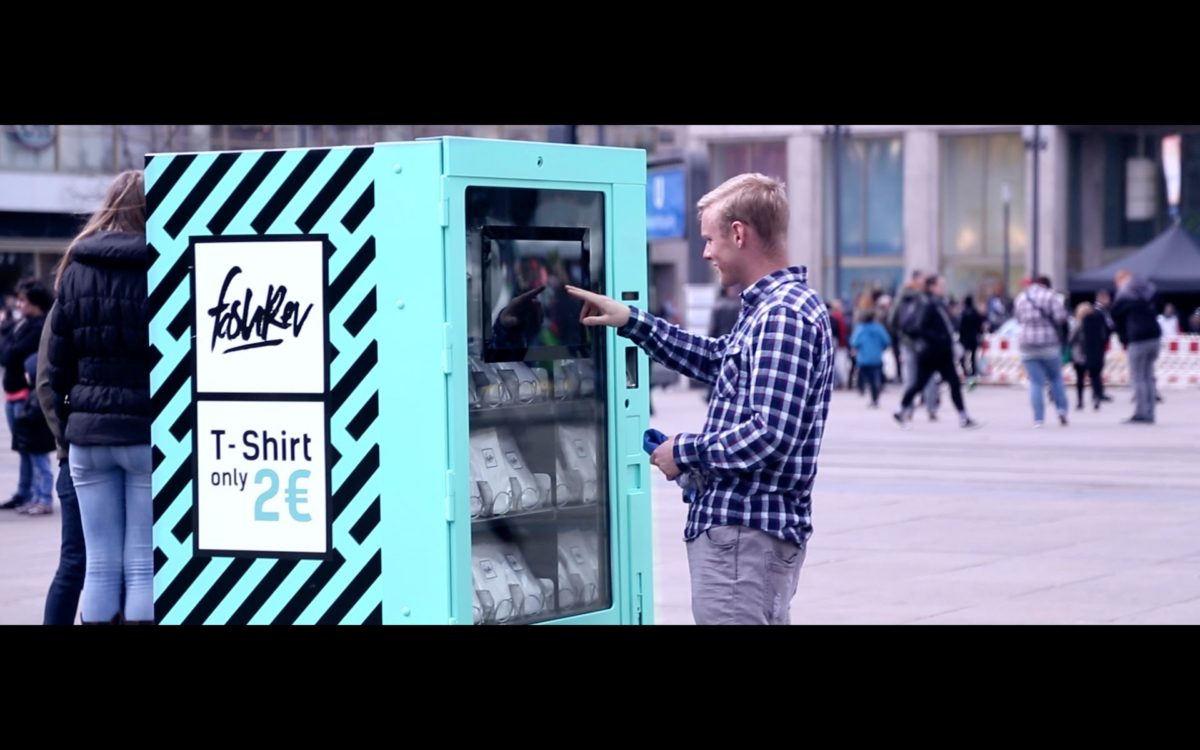[featured-video-plus]
Würdest du ein Tshirt für 2 Euro kaufen, wenn dir vorher ein Clip gespielt wird, bei dem dir die mitunter unwürdigen Arbeitsbedingungen gezeigt werden, unter denen es hergestellt worden ist? BBDO Germany & UNIT9 haben es für Fashion Revolution getestet! #FashRev
Mode um jeden Preis – 90 Prozent entscheiden sich dagegen
High Fashion zum Spottpreis – so lautet heutzutage das Motto. Doch was passiert, wenn die Konsumenten mit eigenen Augen sehen, unter welchen Bedingungen die Mode-Schnäppchen hergestellt werden? Das hat ein Experiment im Vorfeld des Fashion Revolution Day am 24. April gezeigt. Auf dem Berliner Alexanderplatz wurden Menschen, die gerade einkaufen mit den Produktionsbedingungen eines Billig-Shirts konfrontiert und vor die Wahl gestellt, ob sie das vermeintliche Schnäppchen wirklich kaufen wollen. Acht von zehn haben sich dagegen entschieden. Ein Video dokumentiert die Aktion.
Berlin, 23. April 2015. Knall-türkis ist der Automat, der mitten auf Berlins Alexanderplatz steht. Er verspricht: „T-Shirt only 2 Euro“. Weiße T-Shirts von S bis XL – für jede Größe ist etwas dabei. Und mit 2 Euro sind sie ein echtes Schnäppchen. Steckt man die Münze in den Automaten kommt aber kein T-Shirt heraus. Stattdessen zeigt das Display einen Film. Schockierende Bilder aus Textilfabriken, wo Kinder und Frauen im Akkord nähen. Sie bekommen 13 Cent pro Stunde und arbeiten unter teils lebensbedrohlichen Bedingungen. Nach 20 Sekunden werden die potentiellen Schnäppchenjäger vor die Wahl gestellt: „Buy or Donate“ – willst du das T-Shirt wirklich kaufen? Oder die 2 Euro lieber spenden?
„Ich habe nicht gewusst, unter welchen Bedingungen Kleidung hergestellt wird. Ich bin wirklich schockiert!“ „Dass die Arbeiterinnen in den Fabriken nur 13 Cent pro Stunde bekommen ist nicht gerecht. Davon kann ja niemand leben!“ „Also ich achte jetzt mehr darauf, wo meine Kleidung hergestellt wird.“. Die Betroffenheit der Menschen vor dem Automaten ist groß. Rund 90 Prozent der etwa 150 Menschen, die sich für die T-Shirts im Automaten interessiert haben, entschieden sich gegen einen Kauf.
Ein Video zeigt die Aktion und einige Fakten über Billigtextilien. Die Zuschauer werden aufgerufen das Video zu teilen, um noch mehr Menschen auf das Thema aufmerksam zu machen.
„Wir wollten nicht nur fragen, ob Produktionsbedingungen den Kauf theoretisch beeinflussen, sondern herausfinden, wie die Menschen reagieren, wenn sie die Herstellung der Textilien mit ihren eigenen Augen sehen.“, erläutert Jan Harbeck von BBDO Berlin das Experiment. Die Agentur hat die Aktion gemeinsam mit Fashion Revolution im Vorfeld des Fashion Revolution Day am 24. April durchgeführt. „Die Ergebnisse zeigen mir, wie wichtig Transparenz in der globalen Lieferkette ist“, sagt Annett Borg, Country Coordinator von Fashion Revolution Deutschland. „Durch den Fashion Revolution Day und Aktionen wie diese können Menschen weltweit zeigen, dass ihnen die teilweise unmenschlichen Arbeitsbedingungen in der Textilbranche nicht egal sind.“
Fashion at any cost – 90 percent decide against it
High Fashion at a bargain – that is what everybody wants. But what, if consumers see the conditions, under which the super cheap clothes are made, with their own eyes? An experiment in preparation for the Fashion Revolution Day on April 24, has confronted people with the production conditions of a cheap t-shirt. Fashion shoppers on Alexanderplatz in Berlin were asked, whether they really wanted to buy, what they initially believed to be a real bargain. Nine out of ten decided against it. A video documents the campaign.
Berlin, 23 April 2015. The vending machine standing right in the middle of Alexanderplatz in Berlin is a bright popping turquoise. And it is promising: „T-Shirt only 2 Euro“. The white t-shirts are available in sizes ranging from S to XL, so there is something for everyone. And at 2 Euros they are a real bargain. As soon as the coin disappears into the machine – there is no t-shirt dropping out of it, but a movie being shown on the display. Shocking pictures from textile factories, where women and children sew without a break. They are paid 13 cents per hour. And most of them are working under life-threatening conditions. After 20 seconds the buyer can choose: „Buy or Donate“ – do you really want to buy the t-shirt? Or would you rather donate the 2 Euros?
„I did not know, under which conditions fashion is produced. I am really shocked.“ „It is not fair for the factory workers to be paid only 13 cents per hour. It is impossible to live on that.“ „Well, now I will be pay more attention where my clothes are produced.“ Many people who wanted to buy a t-shirt show genuine concern. Circa 90 percent of about 150 people, who came to the machine, decide against a purchase.
A video shows the campaign and a couple of facts about cheap textiles. The viewers are asked, to share the video to draw the attention of even more people to the topic.
„We did not just want to ask, whether production conditions could in theory influence a purchase, but to find out, how people would react, if they saw textile production with their own eyes“, says Jan Harbeck from BBDO Berlin. The agency carried out the campaign together with Fashion Revolution in preparation of the Fashion Revolution Day on April 24. „To me, the results show, just how important transparency is in the global supply chain“, says Annett Borg, Country Coordinator at Fashion Revolution Germany. „With Fashion Revolution Day and campaigns like this one, people all over the world can show, that they do care about the partly inhuman working conditions in the textile industry.“

